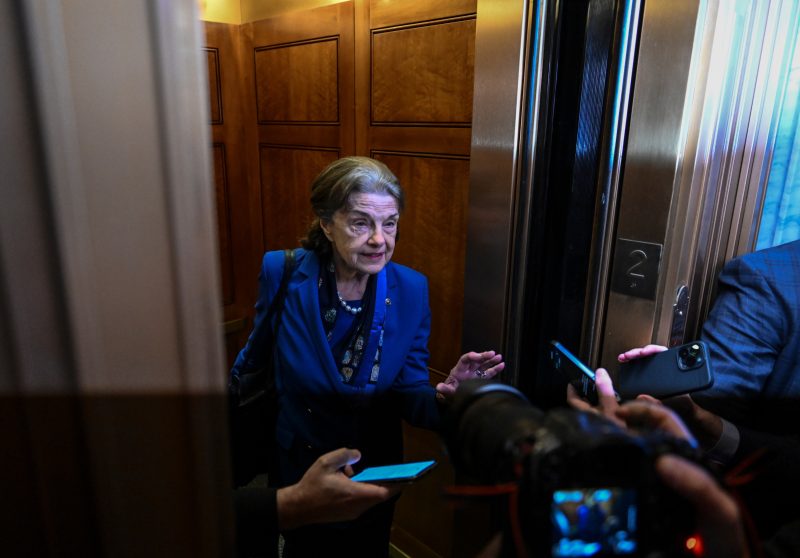Over the last three years, the Democratic Party’s kid-gloves approach to whether the late Supreme Court justice Ruth Bader Ginsburg should have retired during the Obama presidency has arguably proven extremely costly. Ginsburg’s death late in Donald Trump’s presidency meant he was able to fill her seat with Amy Coney Barrett, who last summer provided a decisive fifth vote to overturn Roe v. Wade.
It’s not clear that a different approach would have pushed Ginsburg out when Barack Obama might have replaced her. But you could hardly blame Democrats for lamenting that series of events. So activists and a small number of Democratic lawmakers applied more pressure on Justice Stephen G. Breyer to retire, and he did, last year.
They’re now confronting a somewhat similar situation with Sen. Dianne Feinstein (D-Calif.), and the effort is even more overt than it was with Breyer.
But they’re also discovering there are no easy answers here. And the situation has taken an ugly turn, leading to uncomfortable conversations about politics, age and even gender that could reverberate in the months and years to come.
In recent days, calls have grown for the 89-year-old Feinstein to resign. That’s because her illness-related absence from the Senate Judiciary Committee since mid-February (she was diagnosed with shingles) has hamstrung Democrats’ ability to confirm judges — an increasingly important political metric for administrations.
By Wednesday, those calls had bubbled up from the activist base to include congressional Democrats, Reps. Ro Khanna (D-Calif.) and Dean Phillips (D-Minn.). Phillips accused Feinstein and those who remain silent on the situation of a “dereliction of duty.” Rep. Jamaal Bowman (D-N.Y.) retweeted such a call. Soon, Feinstein’s office issued a statement saying she would instead urge Senate Majority Leader Charles E. Schumer (D-N.Y.) to designate a temporary replacement on the Judiciary Committee, which Schumer agreed he would do.
But while that would seem to mitigate the most significant problem with her absence, it’s not at all clear Schumer would be able to do it. Such a move requires the Senate to sign off, either by unanimous consent or by clearing a 60-vote threshold with the assent of at least 10 Republicans.
Some Republicans might reason that these things are almost always done via unanimous consent and that a party should be able to pick its committee members. But the political benefits of rejecting a replacement are also evident: The GOP could not only prolong the judge-confirmation backlog, but it could prolong what has become a very uncomfortable situation for Democrats.
And the discomfort was reinforced forthrightly early Thursday. Former House speaker Nancy Pelosi (D-Calif.) — a fellow octogenarian female lawmaker who remains a House member — was asked about the calls for Feinstein to resign and suggested sexism was afoot.
“It’s interesting to me,” Pelosi said. “I don’t know what political agendas are at work that are going after Senator Feinstein in that way. I’ve never seen them go after a man who was sick in the Senate in that way.”
.@SpeakerPelosi in defense of Sen. Feinstein: ‘It’s interesting to me, I don’t know what political agendas are at work that are going after Sen. Feinstein in that way. I’ve never seen them go after a man who was sick in the Senate in that way.’ FULL STORY: https://t.co/hAgIlCpuo1 pic.twitter.com/oLQr8i7blH
— KTVU (@KTVU) April 13, 2023
In addition to Feinstein, Sen. John Fetterman (D-Pa.) and Senate Minority Leader Mitch McConnell (R-Ky.), who is 81, have recently experienced lengthy health-related absences. Pelosi seemed to be accusing her own party’s base of a sexist campaign against her ally.
By Thursday afternoon, Sen. Chris Murphy (D-Conn.) echoed Pelosi’s comments on MSNBC. He also seemed to insinuate that Khanna wanted Feinstein out so that Rep. Barbara Lee (D-Calif.), whom Khanna has endorsed for Senate, could be appointed as a replacement. (Gov. Gavin Newsom has said he would appoint a Black woman in such a scenario. Lee’s top opponents in the Senate race are White.)
Lurking in the background of this conversation are a few factors.
One is that, while Feinstein, a former San Francisco mayor, is regarded as a Democratic icon, she has in recent years alienated some of the liberal base — in part through her actions during the Supreme Court confirmations of both Brett M. Kavanaugh in 2018 and Barrett in 2020. Ahead of the latter hearings, some Democrats fretted that the then-87-year-old ranking member of the Judiciary Committee was no longer fit to lead her party into such high-stakes proceedings.
The California Democratic Party in 2018 also declined to endorse Feinstein’s reelection bid, with delegates providing more votes for a more-liberal Democratic challenger.
The second factor is where this conversation could go from here. Despite Pelosi’s suggestion, there are unusual stakes right now, relative to your average aging and/or ailing senator. The Senate majority is so tight (51 to 49 Democratic) that even one poorly placed absence can make a major difference. And Feinstein’s absence is poorly placed, given the committee’s importance and the fact that Democrats control it by the slimmest of margins, 11 to 10.
Trump was able to substantially recast the judiciary during his four years in office, and Democrats are still struggling to claw back the ground they lost, due to a series of variables. Democrats also face a difficult Senate map in 2024, meaning they might not be able to confirm judges if Biden wins reelection.
Were it not for Feinstein’s utility in confirming judges and the fact that her absence has lingered for two months with no end in sight, it’s unlikely we’d see anything like the current imbroglio.
But it is valid to worry about where such things could go in the future. If critics can push out one duly elected lawmaker, what about other aging lawmakers who confront lengthy health challenges? Lawmakers must worry about when such a campaign might come for them before they’re ready to call it quits.
The Democratic Party is also grappling with the potential reelection bid of an octogenarian president whose mental sharpness a majority of Americans (although only a small minority of Democrats) have questioned. Biden’s team has to worry about how the Feinstein situation will play out, especially to the extent it touches not just on practical considerations but also her frequently reported-upon decline.
In some ways, it’s a fair and perhaps overdue conversation to have, given that our leadership has continued to get older over time — especially at the highest levels of government. But that doesn’t mean it’s a fun one, as the latest events demonstrate.
The best-case scenario for Democrats is that this goes away sooner rather than later, either because the Senate allows for a Judiciary Committee replacement or because Feinstein acquiesces (she has already said she won’t seek reelection next year). But the former will require Republicans, and the latter would require Feinstein to end her career by effectively being forced out, which is not how any proud longtime public servant wants to go.
If nothing else, the experiences of both Ginsburg and now Feinstein might serve as cautionary tales to others who might stick it out longer than their supporters would like. However it turns out, it seems our political paradigm is shifting in real time.



























